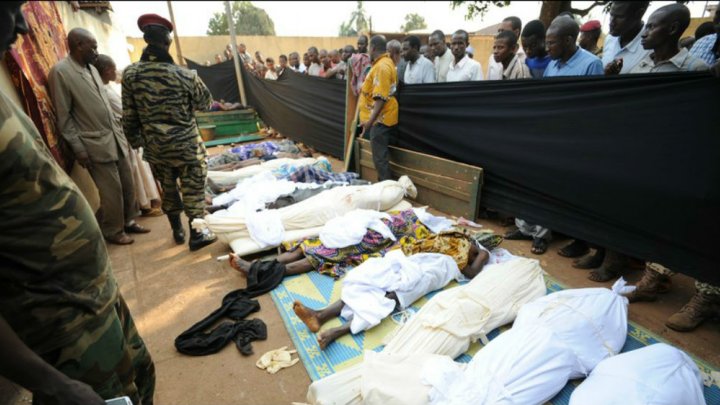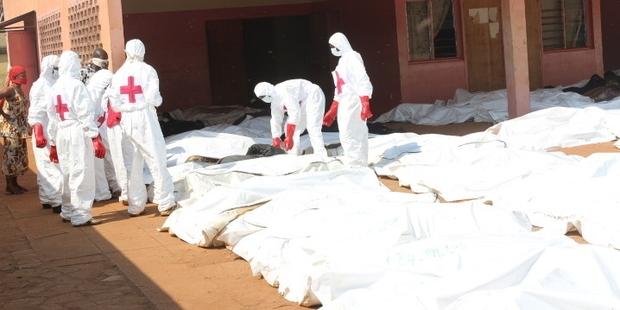www.aljazeerah.info
News, December 2013
Archives
Mission & Name
Conflict Terminology
Editorials
Gaza Holocaust
Gulf War
Isdood
Islam
News
News Photos
Opinion Editorials
US Foreign Policy (Dr. El-Najjar's Articles)
www.aljazeerah.info
|
Editorial Note: The following news reports are summaries from original sources. They may also include corrections of Arabic names and political terminology. Comments are in parentheses. |
Nearly 1,000 killed over 2 days in Central African Republic, Amnesty International Report
December 19, 2013
 |
 |
Central African Republic: War crimes and crimes against humanity in Bangui
Amnesty International, 19 December 2013
War crimes and crimes against humanity are being committed in the
Central African Republic, Amnesty International said at the close of a
two-week mission to the country.
The organization is calling
for the rapid deployment of a robust UN peacekeeping force with a clear
mandate to protect civilians – and sufficient resources to do so
effectively.
“Our
in-depth research on the ground in the Central African Republic over
the past two weeks has left no room for doubt that war crimes and crimes
against humanity are being committed by all parties to the conflict,”
said Christian Mukosa, Amnesty International’s Central Africa expert.
“Crimes that have been committed include extrajudicial executions,
mutilation of bodies, intentional destruction of religious buildings
such as mosques, and the forced displacement of massive numbers of
people.”
The three-person Amnesty International delegation has
documented the violations and abuses that have taken place since
violence erupted on 5 December in the capital, Bangui, with an early
morning attack by anti-balaka militia.
In some neighbourhoods,
the anti-balaka forces went door to door and killed approximately 60
Muslim men. The de facto government forces, known as ex-Seleka,
retaliated on a larger scale against Christians in the wake of the
attack, killing nearly 1,000 men over a two-day period and
systematically looting civilian homes. A small number of women and
children were also killed.
During the days that followed the
initial burst of violence in Bangui, human rights violations and abuses
continued at a staggering pace.
Despite the presence of French
and African military forces meant to protect the civilian population,
civilians are being wilfully killed on a daily basis, with at least 90
additional people killed since 8 December. Some victims have been shot;
others have been killed by angry mobs with machetes; others have even
been stoned.
The complete absence of justice and accountability
for these crimes has led to a downward spiral of revenge killings and to
deepening inter-communal hatred and mistrust. In total 614,000 people
have been displaced across the country – 189,000 in Bangui alone, a
quarter of the city’s population.
“The continuing violence, the
extensive destruction of property, and the forced displacement of the
population in Bangui are feeding enormous anger, hostility and
mistrust,” said Christian Mukosa.
“There can be no prospect of
ending the cycle of violence until the militias are disarmed and there
is proper and effective protection for the thousands of civilians at
risk in the country. Residential neighbourhoods must be made safe as an
urgent priority in order to allow people to go back to their homes and
resume their normal lives.”
Any disarmament process must be
accompanied by effective physical protection measures, particularly in
crisis hotspots such as the PK5, Miskine and Combattant neighbourhoods.
Amnesty International has learned of revenge attacks on those who have
been disarmed to date.
One of the most worrying aspects of the
current situation is the blurring of lines between organized armed
groups and civilian mobs. In many cases it has been difficult to
identify those responsible for the killings, but it is clear that many
local civilians advocate violent acts of revenge, and some are
participating in them.
Both the Christian and Muslim
communities have a deep sense of anger and grievance – many people have
shown Amnesty International researchers photos and videos of slaughter
that they keep on their mobile phones.
Amnesty International
believes that more international troops are urgently needed to ensure
security in Bangui and elsewhere in the Central African Republic.
The African Union has promised to deploy up to 6,000 troops in a new
peacekeeping force which is due to take authority in the Central African
Republic on 19 December. This deployment is urgently needed but the
makeup and deployment plans for the troops have not yet been spelled
out.
Amnesty International is also calling on the UN to expedite
its plans to set up a commission of inquiry to investigate war crimes,
crimes against humanity and gross violations of human rights.
“It is important to establish responsibility for the crimes that have
been committed by all sides in this conflict and ensure an end to
decades of impunity that have prevailed in this country,” said Christian
Mukosa. The organization has received credible information about militia
leaders who are directly implicated in the attacks and should be brought
to justice.
“The international community has an important role to
play in the Central African Republic, ensuring peacekeeping forces are
deployed with all haste and are given the resources they need to prevent
even greater bloodshed.”
Amnesty International will present its
preliminary findings in a briefing at a press conference today in
London. It will publish a more in-depth report in early 2014.
Human Rights Watch is publishing a separate report focusing on an
escalation of sectarian violence and atrocities in Ouham province in
northern Central African Republic.
Nearly 1,000 killed over 2 days in Central African Republic, Amnesty International Report
France 24, December 19, 2013
The death toll from a two-day rampage by mostly Muslim ex-rebels in the Central African Republic (CAR) capital Bangui two weeks ago was much higher than first thought, with close to 1,000 people killed, Amnesty International said Thursday.
Violence erupted in the city on December 5 when Christian militias known as "anti-balaka" went door-to-door in some districts in the capital "and killed approximately 60 Muslim men", Amnesty said.
Muslim groups then retaliated "on a larger scale against Christians in the wake of the attack, killing nearly 1,000 men over a two-day period and systematically looting civilian homes. A small number of women and children were also killed".
The UN earlier estimated 450 people had been killed in Bangui and 150 elsewhere in the country.
CAR, a mostly Christian country, spiralled into chaos after Michel Djotodia's mainly Muslim Seleka rebel group overthrew President François Bozizé in March.
Seleka was disbanded after the coup, but many rebels went rogue, terrorising civilians with massacres, rapes and lootings.
In response, locals formed Christian vigilante groups, leading to an explosion of sectarian violence among Muslims and Christians who previously had long lived together in harmony.
The UN estimates some 210,000 people have been forced from their homes in the capital alone.
Some badly affected cities, like Bossangoa in the northwest, have become little more than ghost towns, with terrified residents huddling in Christian and Muslim camps, separated by a strip of no man's land that only aid workers dare cross.
War crimes
According to Amnesty International, which has compiled a report based on a two-week fact-finding mission to CAR, war crimes are frequently being committed by both sides in the conflict.
The information gathered "has left no room for doubt that war crimes and crimes against humanity are being committed by all parties to the conflict," said Christian Mukosa, Amnesty International's Central Africa expert.
France has already sent 1,600 soldiers to its former colony to bolster an African Union peacekeeping force, but Amnesty said that despite the foreign intervention "civilians are being wilfully killed on a daily basis, with at least 90 additional people killed since 8 December".
Paris has appealed for other European governments to contribute to the military operation in CAR and on Tuesday French Foreign Minister Laurent Fabius said that support would soon be on its way.
“We will soon have troops on the ground from our European colleagues," he told France’s parliament in response to a question on a perceived lack of European support in CAR.
But while Germany, Britain and others have provided logistical support, France is alone in sending combat troops to the country.
In its own report released Thursday, Human Rights Watch warned that without additional foreign intervention, further violence in CAR is likely.
"The UN Security Council needs to act quickly to bring this evolving catastrophe to a halt," said Peter Bouckaert, who authored the report.
"The potential for further mass violence is shockingly high," he added.
(FRANCE 24 with AFP and REUTERS)
Belgium ready to help in CAR under ‘European framework’
Belgium is prepared to help in a military effort to secure Bangui Airport in the Central African Republic but only part of a “European framework”, the country’s Foreign Minister Didier Reynders said Wednesday.
There would be no “exclusive Belgian intervention in the matter”, he told public broadcaster RTBF in comments that would appear to conflict with earlier reports that Belgium was preparing to send 150 troops to the country.
The Belgium government had already announced on Friday it was sending two aircraft to CAR to offer logistical support.
Date created : 2013-12-19
Central African Republic to bring forward elections to 2014
December 19, 2013
(Reuters) -
Central African Republic will bring forward presidential elections to next year, Prime Minister Nicolas Tiangaye said on Thursday, bowing to pressure from former colonial power France to speed up a transition after a March coup.
Interim President Michel Djotodia, leader of the Seleka rebel group that seized the capital Bangui in March, was set to remain in office until 2015 under a deal hammered out with regional African powers.
After talks in Bangui with the U.S. ambassador to the United Nations Samantha Powers on Thursday, Tiangaye said that members of a new national electoral authority would be sworn in by early next week.
"They will be in charge of preparation and organization of the election, which will take place in 2014," he said.
France deployed troops to the resource-rich country this month in an attempt to halt a wave of killings between mostly Muslim Seleka and Christian defense militias.
Rights group Amnesty International said on Thursday that Seleka had killed nearly 1,000 people in the capital alone over two days in retaliation for an attack by Christian militias on December 5. Sixty bodies of Muslims were also found, it added.
France has been openly critical of Djotodia's government. It warned that the dismissal of three ministers last week was a violation of an agreement covering the transition period.
(Reporting by Bate Felix; Writing by Emma Farge; Editing by Daniel Flynn)
Fair Use Notice
This site contains copyrighted material the
use of which has not always been specifically authorized by the copyright
owner. We are making such material available in our efforts to advance
understanding of environmental, political, human rights, economic,
democracy, scientific, and social justice issues, etc. We believe this
constitutes a 'fair use' of any such copyrighted material as provided for
in section 107 of the US Copyright Law. In accordance with Title 17 U.S.C.
Section 107, the material on this site is
distributed without profit to those
who have expressed a prior interest in receiving the included information
for research and educational purposes. For more information go to: http://www.law.cornell.edu/uscode/17/107.shtml.
If you wish to use copyrighted material from this site for purposes of
your own that go beyond 'fair use', you must obtain permission from the
copyright owner.
|
|
|
|
||
|
||||||


